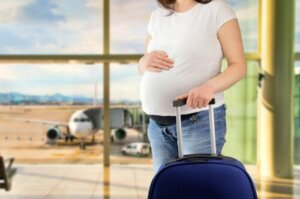How to Travel Safely During Pregnancy?


Written and verified by the teacher Samanta Ruiz
Being pregnant isn’t necessarily an impediment to going on a trip. You only have to consult with your doctor to know the guidelines to follow and be able to travel safely during pregnancy.
Unless it’s a high-risk pregnancy or there’s a specific medical contraindication, any time is suitable for traveling. But remember to follow your doctor’s recommendations to a tee and apply common sense at all times. This way, you and your baby can enjoy the adventure.
Stages of pregnancy and travel
Guidelines for safe travel during pregnancy vary according to the trimester you’re in. Next, we’ll explain what to consider during each trimester in order to travel safely during pregnancy.
First trimester: Short trips and nearby destinations
During the first three months of pregnancy, it’s common to feel nauseous, experience some vomiting, and suffer from a lot of fatigue. Therefore, it’s a good idea to choose nearby destinations that don’t require long journeys. In addition, it’s important that they be for relaxing tourism and allow you to rest.
Nausea will probably intensify during the trip, so you should ask your doctor what medicines you can take and take them with you in your handbag.

Second trimester: The ideal time to travel
The period between weeks 14 and 26 is the perfect time to travel, as the discomfort usually disappears and you feel radiant.
Also, at this time, the risk of miscarriage is minimal, you still have enough agility to move, and your energy level increases significantly. In fact, you’ll see that your mood improves as well.
These months are great for taking a trip a little further away, as long as you make sure you have close medical attention in an emergency.
Third trimester: Some extra precautions
Weight gain, fatigue, and lack of agility limit movement, so you have to choose carefully where and how to travel. The best suggestion is to choose a destination that’s nearby, relaxed, and that allows you to use a comfortable means of transport.
It’s best not to travel more than 300 miles from your place of residence and your primary medical center. Keep in mind that, in any emergency, it’s best to turn to the professionals who’ve monitored you during pregnancy and who know your medical history.
Recommendations according to the means of transport
If what you want is to travel safely during pregnancy, here are some recommendations to choose the most appropriate means of transport:
- Car: While you can still drive, ideally, you should ride in the back seat with your seatbelt on for the entire trip. The advantage of going by car is that you can stop, walk, and stretch your legs whenever you need to.
Experts recommend stopping for a walk every hour in order to promote blood circulation and avoid thrombosis.
- Plane: You have to check with your airline about the requirements to travel while pregnant. Some request a medical certificate indicating the maximum gestation time to fly. This means of transport is ideal for long distances, but it’s not the most comfortable for pregnant women. In general, space is tight, your belt is uncomfortable, you spend a lot of time sitting, and you can’t hydrate properly. Helpful tip: Ask for a seat near the bathroom!
- Train: By far, this is the most comfortable means of transport for pregnant women, as you do not need to wear a belt, you have space to walk, and there are bathrooms available.
- Boat: This means of transport isn’t highly recommended, as a long journey implies being a long time away from any health center. Either way, check with the company to verify their policies. In general, shipping companies don’t authorize travel after the 27th week of gestation.
- Bus: This means of transport isn’t recommended for pregnant women. as many don’t have a bathroom, there’s no place to walk, and if you do it in the aisle, the risk of falling is enormous.
Safe Travel During Pregnancy: Some Final Tips

Planning is essential so that your trip is perfect and you don’t take unnecessary risks.
For this reason, it’s important that you consider these final tips to put your plan together, have a great time, and return calmly:
- Take out travel insurance that covers pregnancy.
- Before traveling, be aware of the closest medical center to your destination located.
- Avoid vacationing in areas of high altitude or extreme temperatures, areas with outbreaks of infectious or insect-borne diseases (such as dengue or Zika), and places that require immunization with live virus vaccines.
Lastly, use common sense, pay attention to what your body is telling you, and act accordingly. Don’t rush an excursion or a hike in order to meet a schedule.
Always put your well-being and that of your baby first. Only then can you travel safely during pregnancy and enjoy it to the fullest!
Being pregnant isn’t necessarily an impediment to going on a trip. You only have to consult with your doctor to know the guidelines to follow and be able to travel safely during pregnancy.
Unless it’s a high-risk pregnancy or there’s a specific medical contraindication, any time is suitable for traveling. But remember to follow your doctor’s recommendations to a tee and apply common sense at all times. This way, you and your baby can enjoy the adventure.
Stages of pregnancy and travel
Guidelines for safe travel during pregnancy vary according to the trimester you’re in. Next, we’ll explain what to consider during each trimester in order to travel safely during pregnancy.
First trimester: Short trips and nearby destinations
During the first three months of pregnancy, it’s common to feel nauseous, experience some vomiting, and suffer from a lot of fatigue. Therefore, it’s a good idea to choose nearby destinations that don’t require long journeys. In addition, it’s important that they be for relaxing tourism and allow you to rest.
Nausea will probably intensify during the trip, so you should ask your doctor what medicines you can take and take them with you in your handbag.

Second trimester: The ideal time to travel
The period between weeks 14 and 26 is the perfect time to travel, as the discomfort usually disappears and you feel radiant.
Also, at this time, the risk of miscarriage is minimal, you still have enough agility to move, and your energy level increases significantly. In fact, you’ll see that your mood improves as well.
These months are great for taking a trip a little further away, as long as you make sure you have close medical attention in an emergency.
Third trimester: Some extra precautions
Weight gain, fatigue, and lack of agility limit movement, so you have to choose carefully where and how to travel. The best suggestion is to choose a destination that’s nearby, relaxed, and that allows you to use a comfortable means of transport.
It’s best not to travel more than 300 miles from your place of residence and your primary medical center. Keep in mind that, in any emergency, it’s best to turn to the professionals who’ve monitored you during pregnancy and who know your medical history.
Recommendations according to the means of transport
If what you want is to travel safely during pregnancy, here are some recommendations to choose the most appropriate means of transport:
- Car: While you can still drive, ideally, you should ride in the back seat with your seatbelt on for the entire trip. The advantage of going by car is that you can stop, walk, and stretch your legs whenever you need to.
Experts recommend stopping for a walk every hour in order to promote blood circulation and avoid thrombosis.
- Plane: You have to check with your airline about the requirements to travel while pregnant. Some request a medical certificate indicating the maximum gestation time to fly. This means of transport is ideal for long distances, but it’s not the most comfortable for pregnant women. In general, space is tight, your belt is uncomfortable, you spend a lot of time sitting, and you can’t hydrate properly. Helpful tip: Ask for a seat near the bathroom!
- Train: By far, this is the most comfortable means of transport for pregnant women, as you do not need to wear a belt, you have space to walk, and there are bathrooms available.
- Boat: This means of transport isn’t highly recommended, as a long journey implies being a long time away from any health center. Either way, check with the company to verify their policies. In general, shipping companies don’t authorize travel after the 27th week of gestation.
- Bus: This means of transport isn’t recommended for pregnant women. as many don’t have a bathroom, there’s no place to walk, and if you do it in the aisle, the risk of falling is enormous.
Safe Travel During Pregnancy: Some Final Tips

Planning is essential so that your trip is perfect and you don’t take unnecessary risks.
For this reason, it’s important that you consider these final tips to put your plan together, have a great time, and return calmly:
- Take out travel insurance that covers pregnancy.
- Before traveling, be aware of the closest medical center to your destination located.
- Avoid vacationing in areas of high altitude or extreme temperatures, areas with outbreaks of infectious or insect-borne diseases (such as dengue or Zika), and places that require immunization with live virus vaccines.
Lastly, use common sense, pay attention to what your body is telling you, and act accordingly. Don’t rush an excursion or a hike in order to meet a schedule.
Always put your well-being and that of your baby first. Only then can you travel safely during pregnancy and enjoy it to the fullest!
All cited sources were thoroughly reviewed by our team to ensure their quality, reliability, currency, and validity. The bibliography of this article was considered reliable and of academic or scientific accuracy.
- Biblioteca Nacional de Medicina de los Estados Unidos MedlinePlus (2020). Embarazo y los viajes. Disponible en: https://medlineplus.gov/spanish/ency/patientinstructions/000608.htm
- Tatnai Burnett, M.D. (2021) ¿Es seguro viajar en avión durante el embarazo? Disponible en: https://www.mayoclinic.org/es-es/healthy-lifestyle/pregnancy-week-by-week/expert-answers/air-travel-during-pregnancy/faq-20058087
- Center for Disease Control and Prevention. (2021). Pregnant Women and Zika. Disponible en: https://www.cdc.gov/pregnancy/zika/protect-yourself.html?CDC_AA_refVal=https%3A%2F%2Fwww.cdc.gov%2Fzika%2Fpregnancy%2Fprotect-yourself.html
This text is provided for informational purposes only and does not replace consultation with a professional. If in doubt, consult your specialist.








